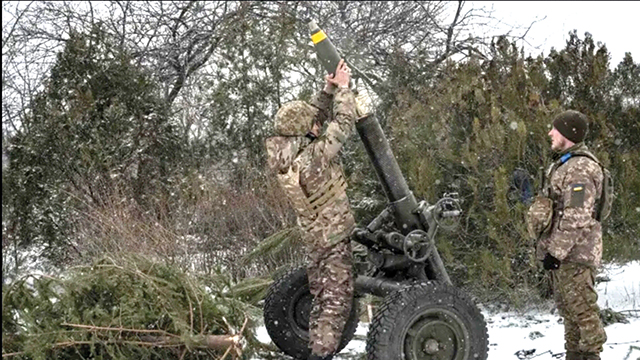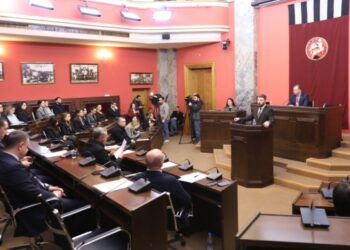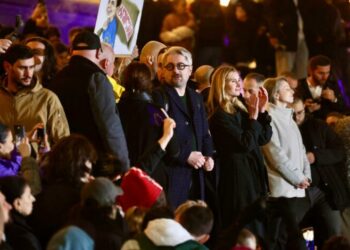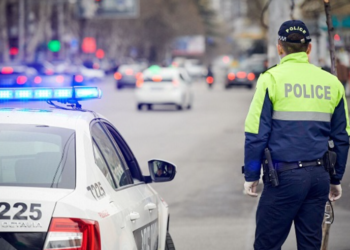Heavy shelling in eastern Ukraine continues, with Kherson, Bakhmut and Donetsk reporting multiple injuries and at least one death.
A new report from the Conflict Observatory, in partnership with Yale University’s Humanitarian Research Lab, alleges Russia has forced more than 6,000 Ukrainian children into “re-education” camps.
The report, titled “Russia’s systematic program for the re-education and adoption of Ukraine’s children,” outlines what it calls the Kremlin’s systematic efforts to abduct children, prevent their return to Ukraine, and “re-educate” them to become pro-Russia.
NATO members are also in Brussels for their last day of talks, during which they pledged to continue support for Ukraine. Still, despite months of pleas from Kyiv for fighter jets, getting them appears unlikely.
Russia has lost half of its best tanks in the Ukraine war
Russia is estimated to have lost about half of its mightiest battle tanks in its unprovoked war against Ukraine, according to the International Institute for Strategic Studies.
Russia’s pre-invasion fleet of T-72B3 and T-72B3M main battle tanks stands at about 50% of its pre-invasion levels, and it has about a third of its pre-war fleet of T-80BV and T-80BU tanks, according to the British group.
“Industrial production continues but remains slow, forcing Moscow to rely on its older stored weapons as attrition replacements,” said John Chipman, International Institute for Strategic Studies Director-General and Chief Executive, during a launch event of the annual Military Balance report.
Secretary Austin says Iran is working to extend Russia’s war in Ukraine
US Secretary of Defense Lloyd Austin told NBC News that Iran is working to extend Russia’s war in Ukraine by supplying the Kremlin with additional weapons.
“I think Iran is working to extend this conflict unnecessarily and inflict casualties on civilians,” Austin told NBC’s Courtney Kube on the sidelines of the NATO defense ministerial.
Austin added that, so far, the US has identified Iranian drones used by Russian forces in Ukraine but has yet to see Iranian ballistic missiles.
“We don’t put it past Russia to request that from Iran. The Ukrainians will soon be getting some Patriot batteries and I think that will be very helpful in addressing any capabilities like that in the future,” Austin said, adding that the Kremlin has also reached out to North Korea for weapons.
NATO vows it will step up support for Bosnia, Georgia, Moldova
NATO has said will step up support for Ukraine and other partners at risk, namely Bosnia and Herzegovina, Georgia, and Moldova, it said in a statement after a meeting of the alliance’s members in Brussels.
NATO Secretary-General Jens Stoltenberg hailed pledges of continued and doubled-down support for Ukraine by members of the 30-country alliance, including “more heavy weapons and military training,” the statement said.
The meeting included approving new guidelines for NATO defense planning, which Stoltenberg said “reflects the reality that we live in a more dangerous world. With Russia’s aggressive behavior, the persistent threat of terrorism, and the challenges posted by China.”
“It will drive the capability changes for the years to come,” he added. “And ensure that our deterrence and defense remain strong and credible.”
European Commission outlines new sanctions package against Russia targeting exports, oligarchs
European Commission President Ursula von der Leyen announced details of the EU’s tenth sanctions package against Russia for its war in Ukraine, which is subject to the approval of EU member countries.
The restrictions target export bans worth 11 billion Euros ($11.78 billion), exports of dual use and advanced tech goods, as well as Russian propagandists.
The sanctions feature new measures to prevent circumvention, von der Leyen said in a statement, including tracking oligarchs who try to “hide or sell their assets” to escape sanctions.
“We now have in place the toughest sanctions ever introduced by the European Union. And we have to ensure that they are rigorously applied,” the statement said.
“We will track oligarchs trying to hide or to sell their assets to escape sanctions. And together with Member States we will set up an overview of all frozen assets of the Russian central bank held in the EU. We need to know where these are located and how much they are worth. This is crucial in view of the possible use of public Russian assets to fund reconstruction in Ukraine.”
“Together, we are tightening the screws on Russia,” von der Leyen said, calling on member states to swiftly adopt the package. “Our aim is to have, together with our G7 partners, further significant sanctions in place by 24 February — exactly one year after Putin launched his imperial war.”
Compiled by Ana Dumbadze














